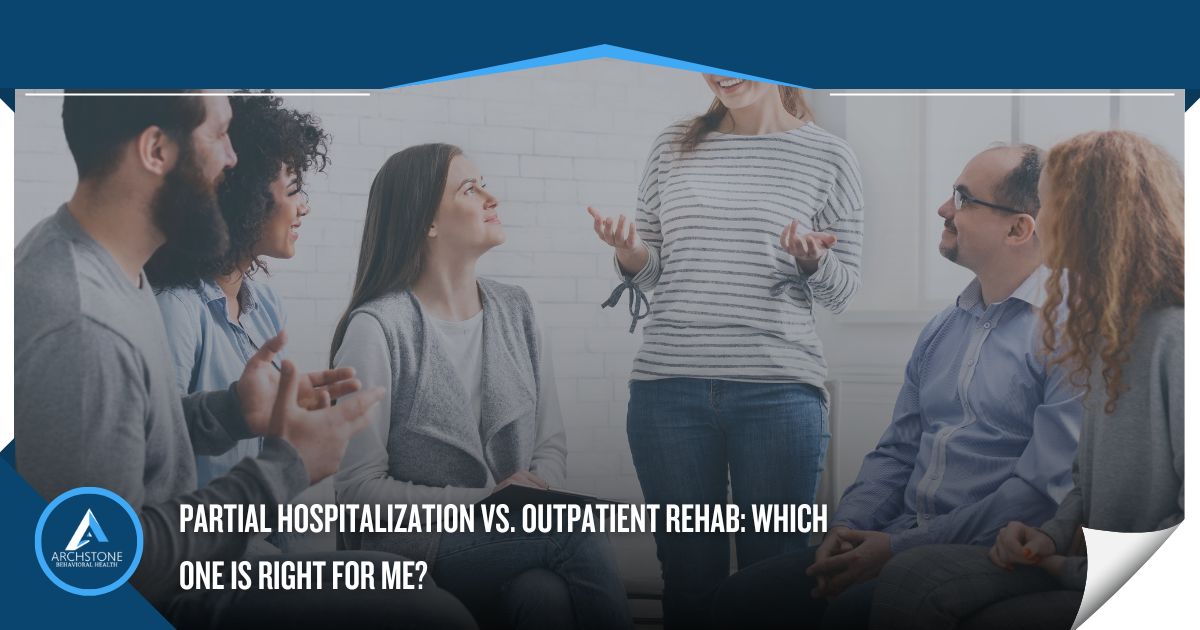Partial Hospitalization vs Outpatient Rehab: Which One is Right for Me?
Get Help Now

According to the Substance Abuse and Mental Health Services Administration (SAMHSA), 48.7 million people struggled with addiction in 2022.[1]
Everyone who deals with addiction has their own set of struggles. Addiction treatment centers offer an array of rehab programs. Two of the most common addiction treatment programs are partial hospitalization programs (PHPs) and outpatient rehab.
Choosing between PHP and outpatient rehab might be difficult if you have never been to treatment before. People with mild addictions might benefit from outpatient rehab. However, if you have a higher need for support, PHP might be right for you.
What is a Partial Hospitalization Program (PHP)?
Partial hospitalization programs are one of the types of outpatient treatment.
PHP is one step down from inpatient rehab, meaning it is less intensive. In other words, it offers intensive care without 24/7 monitoring and support. Partial hospitalization programs let you live in the comfort of your own home.
PHP offers a wide range of services, including:
- Medication-assisted treatment (MAT)
- Individual treatment planning
- Individual therapy sessions
- Group therapies
- Educational support groups
- Relapse prevention planning
- Aftercare services
Typically, PHP requires you to attend 3 to 5 weekly treatment sessions. Each day, you will spend about 3 hours at the facility. During these hours, you will engage in therapy intended to help you overcome your addiction.
Who Should Attend PHP?
Partial hospitalization programs suit individuals requiring a high level of care without constant supervision. In other words, PHP is right for people who are not at a high risk of relapse. Because you live at home, you will need to keep yourself accountable.
With that in mind, you still spend significant time in treatment. People with severe addictions will get the intensive support they need during therapy. Because you live at home, there will be a focus on relapse prevention to ensure you stay sober.
What is an Outpatient Rehab?
Outpatient rehab programs are the lowest level of care offered. Keeping this in mind, that does not mean they aren’t effective. People with mild to moderate addictions will benefit from outpatient treatment.
You might also attend outpatient rehab after you complete inpatient treatment. These programs are a great tool in a continuum of care.
Outpatient rehab usually includes three weekly treatment sessions, each involving a couple of hours of recovery services. During treatment, you mainly engage in group counseling and relapse prevention training.
Thankfully, some outpatient rehabs offer medication-assisted treatment services. If you are taking Suboxone or methadone, you can still receive them on an outpatient basis. However, those with specialized needs (i.e., co-occurring disorders) should consider a higher level of care.
Who is Outpatient Rehab Intended For?
Outpatient rehab suits individuals who need addiction treatment but are solid in sobriety. Additionally, it is an excellent option for those who must continue working during recovery. However, if you have mental health conditions that require ongoing treatment, you might need a higher level of care.
Outpatient rehab is right for you if:
- You have a supportive home to live in
- You do not struggle with a severe substance use disorder
- You need to continue working, attending school, or caring for your family
- You do not have co-occurring disorders that require treatment
- You would like to live at home during recovery
- You have a solid support system
- You have already completed medical detox or inpatient treatment
Most people need detox services before joining an outpatient program. Addiction causes you to experience withdrawal symptoms once you stop using the substance. Medical detox ensures that you recover from withdrawal safely and comfortably.
Can I Attend Both PHP and Outpatient Rehab?
Combining outpatient rehab with partial hospitalization programs increases treatment efficacy. If you have a moderate to severe addiction, you might need both programs to recover.
To determine if your addiction is severe, look at these diagnostic criteria:[2]
- Using a substance longer than you intended to
- Unsuccessful attempts to quit substance use
- Spending a lot of time using and recovering from substance use
- Experiencing hard-to-manage cravings to use a substance
- Being unable to fulfill responsibilities at home, school, or work
- Continuing to use substances despite facing social issues
- Losing interest in previously enjoyed activities
- Using drugs or alcohol in risky situations
- Continuing to use substances despite facing health consequences
- Needing a higher dose to experience the desired effect
- Experiencing withdrawal symptoms when you cannot use a substance
If you have 2 or 3 symptoms, your substance use disorder is mild. Next, 4 to 5 symptoms indicate a moderate addiction. Lastly, six or more symptoms mean your addiction is severe.
If you have a moderate to severe substance use disorder, you should attend both PHP and outpatient rehab.
Get Connected to a Top-Rated Drug Rehab Program
Addiction can be difficult to overcome. Thankfully, Archstone Behavioral Health is here to help you. We offer a variety of treatment options, including inpatient rehab and PHP.
Contact us today to learn more about what rehab program is right for you. Our rehab facility offers both inpatient programs and outpatient settings. We can help you return home, achieve long-term sobriety, and thrive in your daily life.
References:
- The Substance Abuse and Mental Health Services Administration (SAMHSA): HHS, SAMHSA Release 2022 National Survey on Drug Use and Health Data, Retrieved January 2024 From https://www.samhsa.gov/newsroom/press-announcements/20231113/hhs-samhsa-release-2022-nsduh-data
- The National Library of Medicine (NLM): Substance Use Screening and Risk Assessment in Adults, Retrieved January 2024 From https://www.ncbi.nlm.nih.gov/books/NBK565474/table/nycgsubuse.tab9/